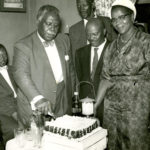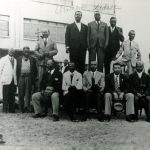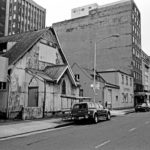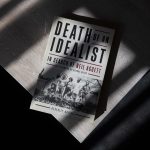From the Archive | Champion, beer and the state
AWG Champion, head of the Industrial and Commercial Workers’ Union (ICU Yase Natal), challenged municipal policies in Durban prohibiting domestic beer making.
Author:
7 February 2019

In the second of this two-part series to mark the centenary of the founding of the Industrial and Commercial Workers’ Union (ICU) , New Frame republishes work by historian Shula Marks that sketches out how Allison Champion organised beerhall boycotts in Durban, and how the state responded with reform that, in the end, further repressed the workers.
Part one:
This is an edited excerpt from The Ambiguities of Dependence in South Africa: Class, Nationalism, and the State in Twentieth-Century Natal (1986) by Shula Marks.
‘Agitator’
The riot in Durban was followed by a government commission, which had some harsh things to say about Champion, and a visit to Durban by the government-appointed advisory Native Affairs Commission in December 1929. The commission reported “with some reluctance” that Champion had “established an influence which … is … fraught with dangerous consequences”.
It reminded the minister for native affairs that, under the recently passed Riotous Assemblies Act, “the Governor-General has, as Supreme Chief, the power to remove a native to parts where his activities may be curtailed and, while not recommending that this power be exercised in respect of Champion, the commission feels it may be necessary in the future, unless the situation changes in Durban.” The minister waited another nine months before using these powers.
The delay is noteworthy. The new 1929 Nationalist government under JBM Hertzog elected on a “black-peril” platform, could hardly be accused in general of adopting a kid-glove approach to “native agitators”. It was obsessed at this time not only with the ICU, but with the increased activities of the communists and the radicalisation of the African National Congress.
Related article:
The spread among blacks of Garveyite ideas from the United States and the evident hostility to whites expressed in the slogan, “Africa for the Africans”, added to the ferment in town and countryside and increased the disquiet in ruling-class circles. It was to combat all these activities, indeed, that the Riotous Assemblies (Amendment) Act (no.19) of 1929, under whose terms Champion was eventually banished, was passed.
As a reassertion of state control in November 1929, Minister of Justice Oswald Pirow deemed it necessary to lead a raid at three o’clock in the morning of 500 mounted police from the Transvaal on the Durban barracks and compounds, demanding passes and tax receipts and confiscating potential weapons. As The Star laconically reported, “When the natives saw the machine guns and bayonets, they acquiesced readily to the police search for poll tax defaulters.” Just to make sure, three teargas bombs were also lobbed into the group of men leaving the compounds for work, and “the effectiveness of the new police arm for mass control was immediately demonstrated”. Over 500 Africans were arrested on various charges.
Nevertheless, the beer boycott continued through most of 1929. As Champion wrote shortly after this raid to his friend and sympathiser, Sibusisiwe Violet Makhanya, “Durban is dry. No beer is drunk by natives.”
Coercion with reform
The city fathers, perturbed by the potential loss of some £60 000 in annual revenue and disturbed by the depth of African discontent, decided to match – if somewhat unequally – coercion with reform. As elsewhere and at other times in South Africa (notably during World War II and after 1976), reform was part of the ruling class response to social unrest and was closely related to a preceding period of popular militancy.
In August 1929, the Rotary Club urged the Durban City Council to develop “native recreation on an organised basis” and offered financial assistance both for this and for the appointment of a “native welfare officer”. A similar resolution was passed by the Natal missionary council.
At the beginning of 1930, the city council established a Native Administration Committee to deal exclusively with matters relating to Africans and appointed a Native Advisory Board consisting of four city councillors and 10 Africans drawn as representatives from Durban’s political and church organisations as well as the barracks.
At the same time, the council appointed a welfare officer “charged with the responsibility of investigating complaints, grievances and organising social entertainments, sports and recreation.” Sports and recreation now became a key part of the strategy for diffusing discontent.
Related article:
According to the mayor in the city’s annual report: “The corporation … continued its policy of providing free bioscope entertainments at the various native barracks and institutions including the native women’s hostel in Grey Street …. At the various barracks and locations, indoor games – draughts, ping-pong and the like – are provided by the council for the enjoyment of the natives. A tennis court is in use and others are under construction, and more will be provided if it be found that there is a demand for them. Several football grounds are in use … but the increasing demand makes the provision of further grounds desirable, and no doubt these will be provided in the near future.”
The mayor proposed to form a “native bugle band”, perhaps inspired by the drums and pipes at the ICU march. This strategy of what missionary Ray Phillips called “moralising leisure time” had long been advocated, by missionaries of the American Board and drew on familiar precedents from the United States, where, according to a local newspaper “the expenditure on such facilities had saved several times over the expenditure on the police force …. Recreation … was the railing at the top of the precipice that saved the necessity for a hospital and a cemetery at the bottom.”
Related article:
Durban now explicitly modeled its response on that of Johannesburg, where African working-class militancy after World War I had made some form of liberalisation crucial. There, too, the transatlantic connection had been uppermost in reformers’ minds. The city council in Durban purchased 3 000 acres of land to establish a segregated “native village on thoroughly progressive and up-to-date lines” and bathing booths and lavatory accommodation was provided “on that portion of the beach now set aside for the use of the native people”. Unfortunately, “that portion of the beach” was “on a somewhat dangerous” part of the coast, but the mayor thought this disadvantage could be overcome easily by encouraging a native life-saving corps.
More seriously, the first steps were taken to construct a new African urban location at Umlazi on mission land beyond the borough boundary. Finally, it was hoped that the appointment of the South Africa-wide Native Economic Commission would lead to an improvement in “native affairs” through its investigation of conditions of employment, wage rates, legislation affecting workers and the proportion of revenue Africans contributed directly and indirectly to the public purse.
The mayor concluded his summary of the activities of the council on a note of self-congratulation. He thought they provided “an interesting reply to the unrest and agitation displayed by natives in recent years” and felt that the year had “marked a definite advance in the corporation’s management of its native affairs and considerable progress had been made in meeting the legitimate requests and requirements of the Zulu population in Durban.”
Banned
Champion, too, professed himself well satisfied, offered the full collaboration of the ICU with the Native Advisory Board and welfare officer, and claimed a large share of the credit for these achievements. He became a member of the first Native Advisory Board, one of the two representatives granted to the ICU Yase Natal, and showed every intention of working perfectly happily within the newly established system.
In August 1930, he was apparently even planning retirement from the union because he “had promised Mr Justice de Waal that if the Durban town council would establish the Native Advisory Board, I would retire”. More importantly, he had decided, he “wanted to teach [his] native people commerce.” So satisfactory was his conduct that when the mayor of Durban heard the government had served a banning order on Champion, he was appalled. As he wrote to the minister of justice on 26 September:
“For the past year, relations between whites and blacks have been improving in Durban and throughout Natal (and all have hailed with relief the appointment of the Economic Commission, which we feel will do more to place matters on a permanent good footing than could any other agency). I have been approached by many men of good will … who think with me that we should ask you to suspend the order issued against Champion for so long as he observes his present solemn engagement to take no further part in public affairs.
“Those of us who know him best believe he is entirely sincere in his promises and that he will keep them. As a matter of policy, too, I feel that it would be very unwise to make Champion into a martyr … If you accept Champion’s promises, you have disposed of him not less effectively than were he deported: you would have had the last word, and then Champion’s influence would be more completely destroyed than were he removed to any other part of South Africa.”
Related article:
The mayor was overly sanguine about the municipality’s co-optive strategy. The Communist Party had benefitted greatly from the decline in the ICU, which predated Champion’s departure and was related to the financial problems of the organisation and its internal dissensions. When the party called on workers to burn their hated passes on 16 December, Durban, of all cities, and the dockworkers at the Point, of all workers, responded with an enthusiasm noticeably absent elsewhere.
Inspired by the leadership of a young communist, Johannes Nkosi, a huge crowd assembled at Cartwright Flats, undeterred by the rival attempts of the now ultra cautious leadership of the ICU Yase Natal to prevent any action. After four hours of speeches, the crowd began a march in demonstration on Durban, and the police barred their way. The procession was attacked with ferocity, and Nkosi and three others were stabbed to death.
After this further defeat, Durban slowly simmered down. The forcible removal of several thousand unemployed workers from Durban back to the rural areas as the effects of the world depression began to take effect was probably as important as the display of force and certainly more important than Champion’s disappearance from the scene.
The end
By March 1931, Detective Inspector Arnold of the Criminal Investigation Department in Durban could remark with satisfaction that, as a result of the action taken on 16 December and the prosecution of the participants, “the general situation here has developed into all the various organisations falling apart and practically losing all membership and former power, mistrust having generally taken root amongst the native population.”
Detective Inspector Arnold could take particular credit for the outcome: as a close confidant of Champion, he had been largely instrumental – with AF Batty – in urging Champion to split from the national ICU at the time of his suspension in 1929, and in drawing up a new constitution for the ICU Yase Natal.
Thus, according to Champion in his evidence to the Durban Riots Commission, “Mr Arnold has been our friend all along, and he has attended our committee meetings and taken part in the framing of our constitution. I knew him as a detective when I was a policeman myself. In fact, he was a member of the ICU. Our constitution was actually typewritten through his courtesy in his own office … He knows me and where I live and attended me during my sickness and bought medicine for me at his own expense … I knew that Sergeant Arnold was a detective and on duty when he attended our meetings, but I was afraid of nothing as I had nothing to hide.”
In exile in Johannesburg, ironically, Champion was found a job in the Colonial Banking and Trust Company through the good offices of the director of native labour, Major HS Cooke. His banning order was finally lifted at the end of 1934.





